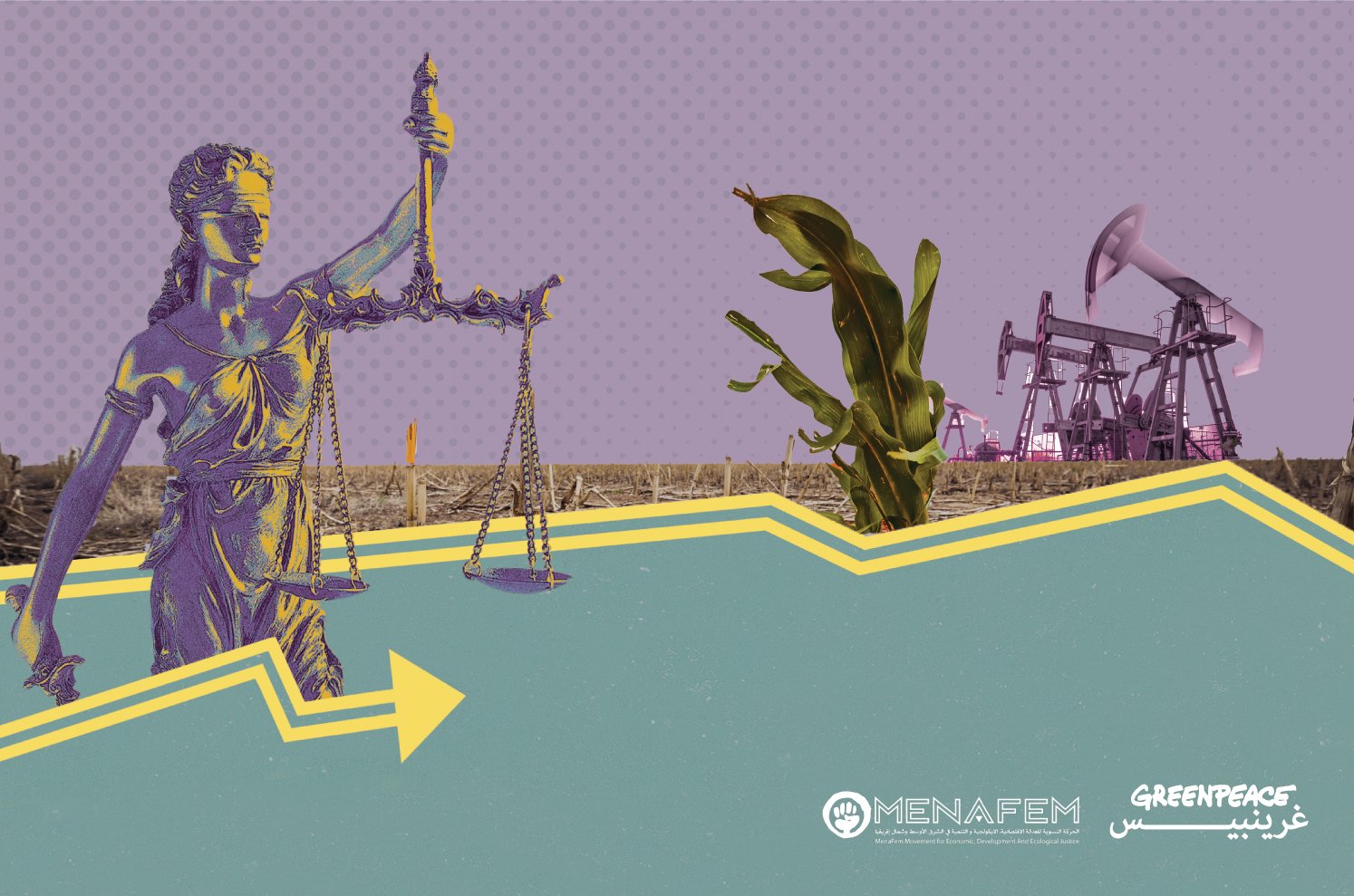Lebanon, Beirut – The transition to a green economy risks deepening inequality and replicating injustices of the fossil fuel era unless governments correct course, warns a new report by Greenpeace MENA and the MENAFem Movement for Economic, Development and Ecological Justice[1].
Research reveals how European investments in Morocco and Egypt’s oil, gas, renewable energy, green hydrogen, and agriculture sectors are reinforcing harmful neocolonial relations by extracting resources to the Global North, with little value added to Global South economies.
The report, titled “Beyond Extractivism: Towards a Feminist and Just Economic Transition in Morocco and Egypt”, analyses how these investments, framed as mutually beneficial, actually perpetuate a cycle of resource depletion, economic dependence and environmental degradation in the host countries – while worsening climate impacts. It also provides case studies, policy recommendations and alternative solutions.
Shereen Talaat, Director of MENAFem Movement said: “The current system that is dominated by the Global North is still financing the climate crisis through extractivist investments such as in fossil fuels. What we need immediately is for wealthy countries to pay up their climate debt to the Global South and phase out fossil fuel investments to support a just transition for all.”
The report finds across the Middle East and North Africa (MENA) and in the Majority World, nations are trapped in extractivist and neocolonial economic models that are deepening the debt crisis and fuelling the climate crisis in a region that is warming up twice as fast as the global average and experiencing extreme weather events and water stress.[2] Net energy importer countries, such as Egypt and Morocco, are facing the added challenge of addressing energy security issues amidst their dependence on imported fossil fuels and growing energy demand.
Hanen Keskes, Campaigns Lead at Greenpeace MENA, says:
“We urgently need a systemic shift in how global energy transitions are pursued. Investments in renewable energy and green hydrogen in countries like Egypt and Morocco should prioritise local development, sustainability, and justice rather than perpetuating neocolonial dynamics. The Global North must take responsibility for reducing its own consumption and building domestic renewable capacity, instead of externalising socio-environmental costs to the Global South. We must continue to fight to decolonize and transform the global financial architecture.”
Key findings from the report:
- Oil and gas projects are degrading ecosystems and depleting essential resources like water and arable land, disrupting biodiversity and long-term resource stability. The report raises concerns about Europe’s push for green energy projects in North Africa, like green hydrogen, arguing that these projects are more about securing Europe’s energy needs than genuinely supporting sustainable development and a just transition in the Global South.
- Prioritising exports over local benefits fosters dependency and entrenches socio-economic disparities. Rural and marginalised communities are disproportionately affected, facing displacement, precarious jobs, and limited access to vital resources. Extractivist practices are deepening gender inequalities by relegating women to low-wage, insecure roles and increasing unpaid care burdens.
- European agribusiness investments in Morocco and Egypt focus on export-oriented cash crops like tomatoes and citrus, which demand substantial water resources and intensify water scarcity in an already dry region.
- Alternatives exist. The report emphasises the need to move away from an economic model of endless growth and embrace a feminist self-sufficiency based economic model that prioritises wellbeing and sustainability. It highlights economic philosophies, grassroots initiatives and community-centric renewable projects in the Global South, which embody the principles of a wellbeing economy that will nurture and protect people and the planet.
Talaat adds: “We urgently need to move away from extractive and neocolonial investments that undermine communities and ecosystems, and transition to a feminist, sufficiency-based wellbeing economic model that puts people and the planet at its core. Only through transformative change can we build sustainable, inclusive, and just societies for the future.”
Keskes adds: “The transition to a green economy cannot replicate the injustices of the fossil fuel era – it must be transformative, inclusive, and centred on the needs of those who are most impacted. This means transforming the global financial architecture for a just transition, through cancelling unfair debt and surcharges, ceasing fossil fuel funding and adopting progressive taxation. Governments have to put wellbeing at the top of the agenda.”
Policy recommendations in the report for a wellbeing economy also include enhancing transparency and accountability in investments, aligning economic models with local values, history and tradition, and helping local communities build on their resilience and capacity.
ENDS
The report “Beyond Extractivism: Towards a Feminist and Just Economic Transition in Morocco and Egypt” is available in English and Arabic. See also Executive Summary here.
Notes:
[1] Established in 2023, the MENAFem movement consists of local and regional organisations dedicated to achieving equitable development and fostering a just, ecologically sustainable feminist economy.
[2] Greenpeace MENA report: ‘Living on the Edge: The Implications of Climate Change for Six Countries in the Middle East North Africa Region.’
Contacts:
Hiam Mardini. Communications and Media Manager at Greenpeace MENA, +96171553232
Greenpeace International Press Desk, +31 (0)20 718 2470 (available 24 hours), [email protected].
Follow @greenpeacepress on X/Twitter for our latest international press releases.
Source link
Greenpeace International www.greenpeace.org


